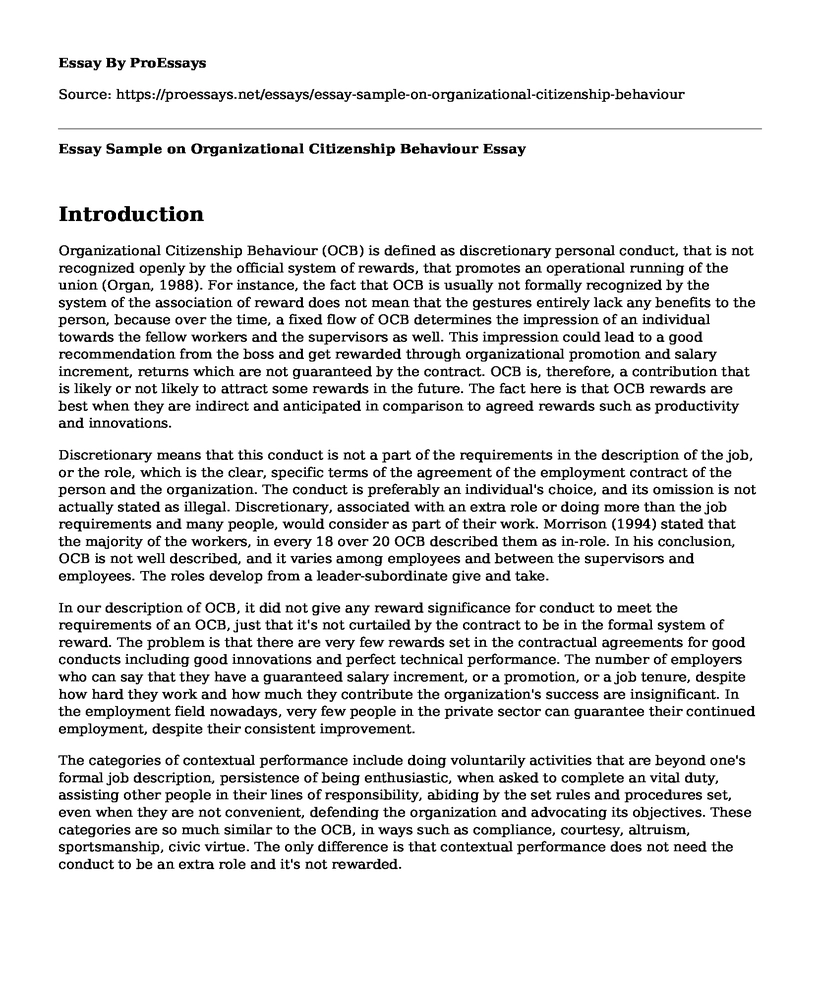Introduction
Organizational Citizenship Behaviour (OCB) is defined as discretionary personal conduct, that is not recognized openly by the official system of rewards, that promotes an operational running of the union (Organ, 1988). For instance, the fact that OCB is usually not formally recognized by the system of the association of reward does not mean that the gestures entirely lack any benefits to the person, because over the time, a fixed flow of OCB determines the impression of an individual towards the fellow workers and the supervisors as well. This impression could lead to a good recommendation from the boss and get rewarded through organizational promotion and salary increment, returns which are not guaranteed by the contract. OCB is, therefore, a contribution that is likely or not likely to attract some rewards in the future. The fact here is that OCB rewards are best when they are indirect and anticipated in comparison to agreed rewards such as productivity and innovations.
Discretionary means that this conduct is not a part of the requirements in the description of the job, or the role, which is the clear, specific terms of the agreement of the employment contract of the person and the organization. The conduct is preferably an individual's choice, and its omission is not actually stated as illegal. Discretionary, associated with an extra role or doing more than the job requirements and many people, would consider as part of their work. Morrison (1994) stated that the majority of the workers, in every 18 over 20 OCB described them as in-role. In his conclusion, OCB is not well described, and it varies among employees and between the supervisors and employees. The roles develop from a leader-subordinate give and take.
In our description of OCB, it did not give any reward significance for conduct to meet the requirements of an OCB, just that it's not curtailed by the contract to be in the formal system of reward. The problem is that there are very few rewards set in the contractual agreements for good conducts including good innovations and perfect technical performance. The number of employers who can say that they have a guaranteed salary increment, or a promotion, or a job tenure, despite how hard they work and how much they contribute the organization's success are insignificant. In the employment field nowadays, very few people in the private sector can guarantee their continued employment, despite their consistent improvement.
The categories of contextual performance include doing voluntarily activities that are beyond one's formal job description, persistence of being enthusiastic, when asked to complete an vital duty, assisting other people in their lines of responsibility, abiding by the set rules and procedures set, even when they are not convenient, defending the organization and advocating its objectives. These categories are so much similar to the OCB, in ways such as compliance, courtesy, altruism, sportsmanship, civic virtue. The only difference is that contextual performance does not need the conduct to be an extra role and it's not rewarded.
Conclusion
The use of the term altruism is one of the repetitive objections in OCB, that is used to mean the assistance towards helpfulness, that is in the method of support to certain people like clients, co-workers, bosses, and associates. A dimension of OCB can be designated as that which does not offer any immediate help to anyone, but shows and keeps high levels of conservation of the organizational resources, punctuality, and attendance. This is the OCB-0 and indicates that the organization is the targeted entity. The OCB-I calls for someone to give it a useful tag that will be analogous to help it.
Reference
Morrison, E. W. (1994). Role definitions and organizational citizenship behavior: The importance of the employee's perspective. Academy of management journal, 37(6), 1543-1567.
Organ, D. W. (1988). Organizational citizenship behavior: The good soldier syndrome. Lexington Books/DC Heath and Com.
Cite this page
Essay Sample on Organizational Citizenship Behaviour. (2022, Dec 06). Retrieved from https://proessays.net/essays/essay-sample-on-organizational-citizenship-behaviour
If you are the original author of this essay and no longer wish to have it published on the ProEssays website, please click below to request its removal:
- Importance of Friends Essay
- Evolution of Monogamy: Beneficial or Suppressing? - Articles Analysis Essay
- Essay Sample on Humanities
- Essay Sample on Gender Roles: The Cycle of Expectations in Society
- Essay on Racial Discrimination: Jury System's Role in Perpetuating Inequality
- Black Power Movement: Actors, Political Orgs and Events - Essay Sample
- Religious and Spiritual Development in Childhood - Paper Example







